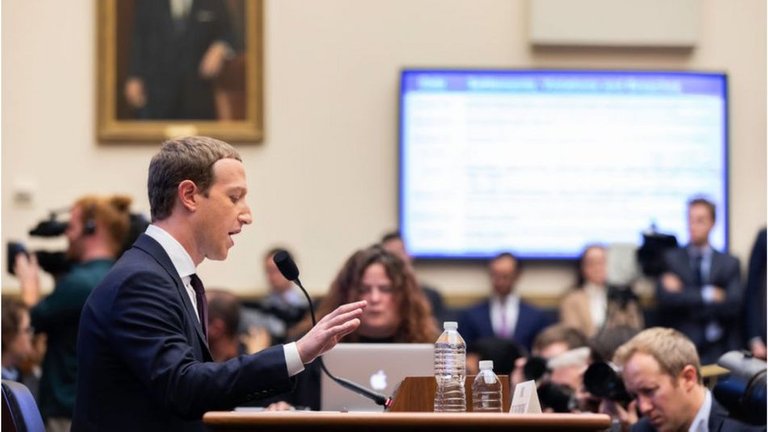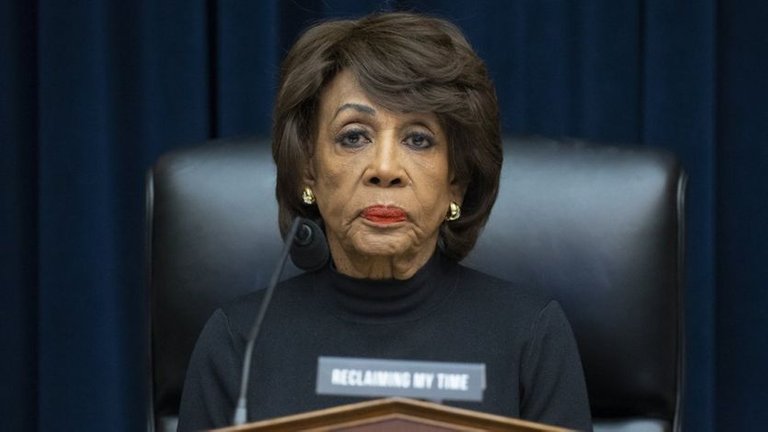
US lawmakers have sharply criticised Facebook boss Mark Zuckerberg about the firm's policy not to fact check political ads.
In a hearing in Washington, the social network chief was accused of letting political disinformation spread ahead of the 2020 US presidential election.
He also was unable to confirm if hate speech from candidates running for office would be taken off the platform.
But he did say it was not his job to police what politicians said.
The tech boss was appearing before the House Financial Services Committee to defend plans for his embattled digital currency Libra.
But he found himself under attack over host of other issues, including failing to stop child exploitation on the social network and the Cambridge Analytic data scandal.
Facebook will not fact-check politicians
Facebook's partners yet to commit money to Libra
Zuckerberg: 'You go to the mat and you fight'
On the social network's policy on political ads, Democrat Alexandria Ocasio-Cortez asked: "I just want to know how far I can push this... could I run ads targeting Republicans in primaries saying that they voted for the Green New Deal?"
The Green New Deal is a Democrat policy fiercely opposed by most Republicans.
Mr Zuckerberg said the platform would take down posts from anyone, including politicians, that called for violence or tried to suppress voter participation.
As for untruths, however, he said it was not Facebook's role to prevent "people in an election from seeing that you had lied".

In another example, Democrat Sean Casten asked if Facebook would remove hate speech in political ads. He noted a former member of the American Nazi Party had run for Congress and won a Republican primary in 2018.
Mr Zuckerberg said: "Congressman, I think that depends on a bunch of specifics that I'm not familiar with this case and can't answer to."
"Well, that's rather shocking," said Mr Casten. "I don't think that's a hard question."
The chief executive was also asked whether Facebook would remove ads that falsely claimed immigrants who participated in the US census would have their details shared with Immigration and Customs Enforcement (ICE).
Mr Zuckerberg said Facebook was in the process of revising its related policies, adding that he could not yet say what the "specifics" would be.
What did he say about Libra?
Mr Zuckerberg also tried to reassure sceptical US lawmakers about the safety of his proposed digital currency Libra, but was given short shrift by most.
The project has faced a series of challenges recently, with key partner organisations having pulled out and mounting regulatory opposition.
Members of Congress raised concerns about whether currency could be used for money laundering, disrupt the global financial system, or give Facebook too much control over data.
Mr Zuckerberg said he was determined to persevere with the plan, arguing it could help more than a billion adults without a bank account worldwide.
But he added: "I get that I'm not the ideal messenger for this right now. We've faced a lot of issues over the past few years and I'm sure there are a lot of people who wish it were anyone but Facebook that was helping to propose this."
As is often the case when Mark Zuckerberg is in Congress, the agenda deviated from the subject at hand.
One exchange stood out. Ann Wagner, a Republican congresswoman for Missouri, said that Facebook's plan to introduce end-to-end encryption on its Messenger app would make it harder for authorities to discover instances of images of child sexual abuse being shared.
That matters: 12 million such images were shared on Facebook last year. It appears to be by far the biggest platform for that kind of illegal material sharing.
While other services, like WhatsApp and Apple's iMessage, are encrypted, experts in child safety say the main Facebook platform is of greater concern when it comes to paedophiles searching for, finding, and grooming children - all on the same platform.
"What are you doing to shut this down?" Ms Wagner demanded to know.
Mr Zuckerberg cited tools developed by Facebook to detect the material, but eventually admitted: "It will be harder to find some of this behaviour."
He'll need to find better answers - or face a scandal that may well dwarf all the others.
What did other panel members say?
Many lawmakers questioned why they should trust Mr Zuckerberg's assurances over Libra, given the social network's past failings in other areas.
Maxine Waters, the Democratic chairwoman of the panel, pointed out that the social network was the subject of an antitrust investigation. She said it had "allowed" Russia to interfere with the US election in 2016.
"It would be beneficial for all if Facebook concentrates on addressing its many existing deficiencies and failures before proceeding any further on the Libra project," she said.
Mr Zuckerberg's personal integrity also came in for attack, with Democrat Madeleine Dean saying: "We earn credibility drop by drop, but we pour it away in buckets."
Some however defended the Facebook boss's track record as an entrepreneur.
"I have my own qualms about Facebook and Libra and the shortcomings of big tech," said Patrick McHenry, the top Republican on the panel.
"But if history has taught us anything, it's better to be on the side of American innovation."
Congratulations @hardeski! You have completed the following achievement on the Steem blockchain and have been rewarded with new badge(s) :
You can view your badges on your Steem Board and compare to others on the Steem Ranking
If you no longer want to receive notifications, reply to this comment with the word
STOPDo not miss the last post from @steemitboard:
Vote for @Steemitboard as a witness to get one more award and increased upvotes!
thank you very much for your congratulatory message!!!
You're welcome @hardeski
Feel free to support us back: vote for our witness.
You will get one more badge and more powerful upvotes from us on your posts with our next notifications.